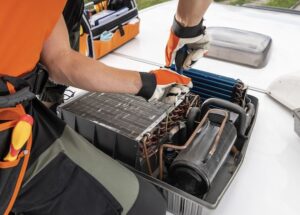The RV Electrical System Guide: Components, Maintenance & Troubleshooting
Owning an RV means having the freedom to travel anywhere with the comforts of home, but that comfort relies heavily on your RV’s electrical system. Whether you’re plugged into shore power or running off batteries, understanding how your RV’s electrical components work can help you stay safe, troubleshoot problems, and avoid costly repairs.
At Ron’s Auto & RV in Vancouver, WA, we service and repair all types of RV electrical systems, from battery replacements to wiring diagnostics. If you’d like to better understand how your system works, this guide breaks down everything you need to know.
Key Components of an RV Electrical System
1. RV Batteries (12-Volt System)

Your RV’s batteries power essential components, such as lights, water pumps, fans, and control panels. Most RVs utilize deep-cycle batteries, which are designed to withstand regular discharge and recharge cycles.
Maintenance Tip: Check battery voltage regularly with a multimeter. A healthy, fully charged battery should read around 12.6 to 12.8 volts. If voltage drops below 12 volts frequently, your battery may be failing or not charging properly.
2. Inverter
The inverter converts 12-volt DC battery power into 120-volt AC power, allowing you to run household-style outlets and appliances like microwaves, TVs, and phone chargers when you’re not plugged into shore power.
Troubleshooting Tip: If your outlets stop working while off-grid, the inverter may be off, overloaded, or experiencing a low-voltage shutdown due to weak batteries.
3. Converter
While the inverter turns DC to AC, the converter does the opposite. It takes 120-volt shore power or generator power and converts it to 12 volts to charge your house batteries and power DC components.
If your lights dim or the battery doesn’t seem to charge when plugged in, the converter could be malfunctioning.
4. Outlets and Breaker Panel
Your RV’s breaker panel distributes 120-volt power to outlets and appliances. If something suddenly stops working, always check circuit breakers and GFCI outlets first. Many RV owners think they have a major issue when it’s just a tripped breaker.
Essential RV Electrical Maintenance Tips
- Keep Connections Clean: Corrosion on battery terminals can cause a voltage drop and poor charging. Clean terminals with a wire brush and apply dielectric grease to prevent buildup.
- Inspect Cables and Wiring: Look for loose, frayed, or overheated wires. High-resistance connections can lead to dangerous overheating.
- Monitor Power Usage: RVs have limited electrical capacity. Plugging in too many high-wattage devices at once (like air conditioners, space heaters, and microwaves) can overload circuits.
- Use a Surge Protector: When connecting to shore power, always use a surge protector or EMS (Electrical Management System) to protect against voltage spikes and wiring faults at campgrounds.
Common RV Electrical Problems & How to Troubleshoot
| Issue | Possible Cause | Quick Fix |
|---|---|---|
| Lights flickering or dimming | Low battery voltage or poor connection | Test voltage and clean terminals |
| Outlet not working | Tripped GFCI or breaker | Reset GFCI or flip breaker |
| The inverter beeping or shutting off | Blown fuse or internal failure | Reset the GFCI or flip breaker |
| The inverter is beeping or shutting off | Overload or low voltage | Unplug devices and recharge batteries |
- If basic troubleshooting doesn’t resolve the issue, it’s best to have a professional RV electrician inspect the system. Electrical problems can quickly escalate into fire hazards if ignored. We also offer diesel truck services.
When to Call a Professional
If you notice burning smells, melted wires, repeated breaker trips, or unexplained power loss, don’t take chances. At Ron’s Auto & RV, we provide RV electrical diagnostics, wiring repairs, inverter and converter replacement, and battery system upgrades for RVs of all types. Understanding your RV’s electrical system helps you stay safe on the road and avoid breakdowns during camping trips.
With routine maintenance and smart power management, you can enjoy worry-free travels. If you need RV electrical repair in Vancouver, WA, or the surrounding areas, contact Ron’s Auto & RV, your trusted local experts in RV wiring, battery systems, and power troubleshooting.
